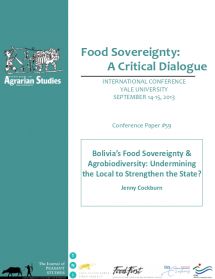Ideas into movement
Boost TNI's work
50 years. Hundreds of social struggles. Countless ideas turned into movement.
Support us as we celebrate our 50th anniversary in 2024.


In Bolivia the notion of Food Sovereignty has been incorporated into the new Constitution. However, one complication relates to how food sovereignty is conceptualized -- and for what end -- by State and NGO actors in agricultural development. Bolivia is home to substantial biodiversity. Like elsewhere, modern agricultural practices, and the prioritizing of a limited variety of ‘cash’ crops over others to meet market demands, have had a deleterious effect.
The arrival of the ‘Green Revolution’ to Bolivia, which transformed farming systems to necessitate the use of agro-chemicals and monocropping practices, resulted in the loss of agrobiodiversity. Local NGOs and the current government have been concerned with ameliorating agrobiodiversity. This orientation includes two anticipated ends: adaptation to climate changes and food sovereignty. The logic underpinning food sovereignty involves the right to produce, distribute and consume nutritious, culturally appropriate food in a way that is ecologically sustainable. Agrobiodiversity conservation is recognized as an important way to achieve this right. Both the NGO and the state have focused attention on organic agriculture and strengthening Bolivia’s internal markets as key to food sovereignty. However they differ in focus.
The State’s need to maintain the stability and profitability of the current agribusiness for exportation leads to emphasizing independence and ownership, an emphasis that, at times, takes precedence over sustainability in food sovereignty. What the State wants, from the perspective of the agronomists in the governmental organizations in this study, is to strengthen sovereignty. A key role of these organizations is to realize greater Bolivian autonomy through ecological agriculture and food sovereignty. However, to the extent that this is tied to a backlash against neoliberalism, it is constrained by neoliberal policy reforms, so that indigenous rights and environmental protection are undermined by immediate political and economic gains (Haargard and Andersson 2009; Kennemore and Weeks 2011).
That food sovereignty from the government’s perspective is also possible through conventional agricultural schemes is one of many examples that illustrate the double narratives and policies of Morales’ administration. The broadened definition applied by the State raises questions over whether food sovereignty will function more as a buzzword than as something that can truly protect agrobiodiversity. This paper is based on findings from my ethnographic research with Quechua farmers in two communities in the Bolivian Andes. In both communities, farm households have been participating in ecological agriculture practices with a local NGO and have more recently joined a State research pilot project into organic agriculture with a national certification scheme.
Despite the shared concerns for increasing agrobiodiversity, food sovereignty and organic farming, between the farmers, the NGO and the State, tensions are evident in the power imbalances embedded in these relationships.
Jenny Cockburn Sociologist Jenny Cockburn received her PhD in Sociology with a specialization in Social Justice from the University of Windsor in June 2013. Her dissertation, based on ethnographic research in farming communities and an NGO in the Bolivian Andes, focused on challenges to agricultural knowledge exchange and collaboration. She is currently working on publications with the intention to conduct post-doctoral research on incorporating a gendered framework into Food Sovereignty in Bolivia.
Food Sovereignty: a critical dialogue, 14 - 15 September, New Haven.